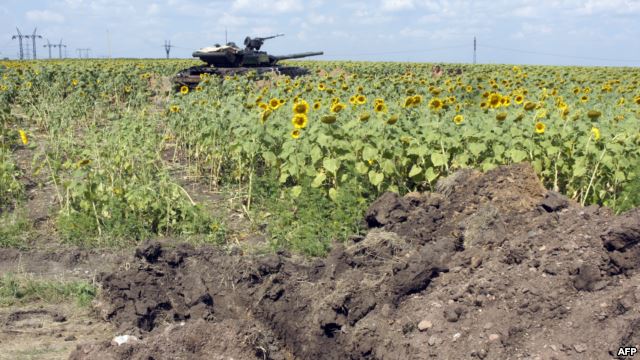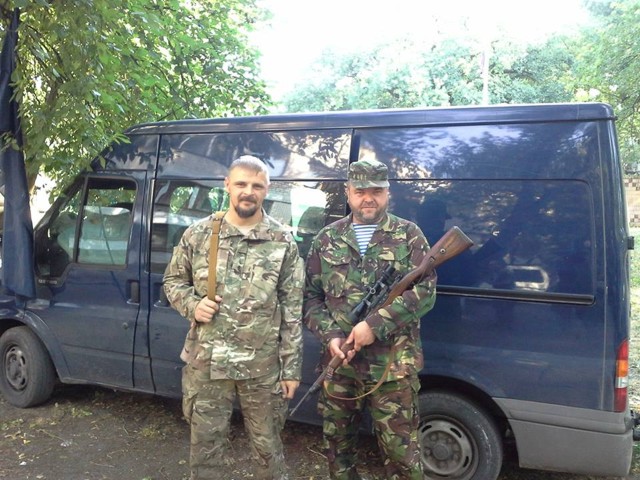Yevgen Solonyna
Kyiv – Two-thirds of Donbas coal mines have been flooded as a consequence of military action, Ukrainian Ecology Minister Andriy Mokhnik reports to Radio Liberty. According to him, underground waters and all of the potable water in the affected coal basin have been polluted as a result of the flooding. The Minister of Ecology accused Russian occupation troops and mercenaries of ruining the environment of Donetsk and Luhansk Oblasts.
The Russian troops and mercenaries in Donbas are intentionally ruining infrastructure, resulting in catastrophic environmental pollution, Minister of Ecology and Natural Resources Andriy Mokhnik told Radio Liberty.
“We cannot calculate the losses exactly - the ecological inspection services practically cannot work on combat territory. We have information that two-thirds of the coal mines [in Donbas] have been flooded, and this means the contamination of underground waters and potable water in the entire coal basin,” the Minister said.
On Donbas territory, where there are powerful water systems, as well as metallurgical, chemical and approximately 600 other factories, any contact with ammunition has detrimental ecological consequences, concludes the Minister. He adds that it is currently difficult to calculate the environmental damage caused by combat. Meanwhile, the government has already estimated over a trillion hryvnia worth of losses from the Donbas war, not including potential damage to the environment.
According to Mokhnik, the damage done to the environment in Donbas is estimated to be in billions of hryvnia. “We will be able to precisely calculate when we return to our territory,” the Minister noted.
As Mokhnik said, the air pollution caused by Russian artillery and the firing of large amounts of powerful ammunition on chemical and metallurgy factories are critical factors.
“So far it is localized to relatively small territory. But, if we take into account Putin’s plans to create ‘Novorossiya’ further in the south of Ukraine, there are other chemical production facilities and two nuclear power plants. If artillery targets them it will be a catastrophe, since these objects are not made to withstand such attacks,” explains Andriy Mokhnik.
The Destruction of the Environment was Planned?
According to the Ecology Minister, the Russian army is intentionally ruining Donbas' infrastructure so that Ukraine will later spend money not on the development of the economy, but rather its renewal.
In the course of the ATO, artillery targeting has caused fires and explosions at several ecologically dangerous production facilities. Among them are the Avdiivka and Yasynivsk chemical plants, the Lysychansk oil processing and Kramatorsk industrial engineering plants, as well as the Tochmash and Styrol factories.
Ukrainian troops affirm that they were not the ones who fired at the production facilities, rather it was done by Russian mercenaries and separatists. The exception is the explosives factory in Petrovske, Luhansk Oblast, where, according to Ukrainian intelligence, pro-Russian forces began producing fugasse mines, and which was subsequently destroyed by ATO troops.
Meanwhile, not only factories have been destroyed in Donbas by the mercenaries and Russian servicemen. The Luhansk steppe reserve has suffered during the invasion, as its main area near the [Russian] border was destroyed and occupied by Russian servicemen and mercenaries, the Ukrainian National Ecology Center reports. According to the experts of the center, the burning of ammunition byproducts has caused serious soil and air pollution. However, in the opinion of the center's deputy head, Olexiy Vasyliuk, the biggest threats are radioactive pollution and the destruction of foliage.
“The main problem is that there is no control. There are flooded mines, in particular in the city of Yenakiyevo, where an experimental underground nuclear explosion was carried out back in the Soviet times. The infrastructure is destroyed, and winter is coming. The locals will cut down an innumerable amount of foliage. There will probably be enough for one winter,” the ecologist predicts.
According to Vasyliuk, there are ecological consequences that are difficult to predict and will first become apparent many years after the war ends. In particular, according to him, the level and type of chemical pollution on Donbas territory occurring due to de-facto war are very difficult to predict at the moment.
Meanwhile, ‘DNR’ and ‘LNR’ representatives accuse Ukrainian servicemen of systematically opening fire on residential buildings and industrial facilities in Donbas. Russia categorically denies the participation of its regular troops in the war in eastern Ukraine, claiming it is “an internal conflict.”
Source: Radio Liberty
Translation by Mariya Shcherbinina, edited by Andrew Kinder





